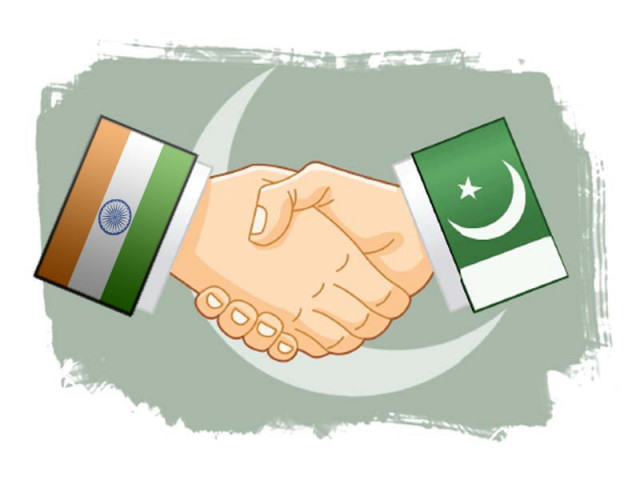India, Pakistan edge toward talks but old distrust remains
The path to negotiating table is littered with familiar obstacles that have bedeviled progress in the past.

The path to negotiating table is littered with familiar obstacles that have bedeviled progress in the past. ILLUSTRATION: JAMAL KHURSHID
Pakistan has proposed dates for resuming the talks, officials in Islamabad and New Delhi said on Monday, but the path to the negotiating table is littered with familiar obstacles that have bedevilled progress in the past.
A lasting peace between Pakistan and India has long proved elusive. With many fearing an upsurge in conflict in Afghanistan after Western forces pull out next year, it is even more important for India and Pakistan to ratchet down tension, according to some analysts.
Indian and Pakistani media said Islamabad had proposed talks on territorial and water related issues in August and September. Indian officials said they were considering the dates. The talks would be at the level of departmental secretary.
Islamabad is also pushing for a meeting between Prime Minister Nawaz Sharif who made better ties with India a theme in his election campaign in May and his Indian counterpart, Manmohan Singh, on the sidelines of the UN General Assembly in New York in September, Indian officials said.
But Pakistan must first address India's concerns over "infrastructure for anti Indian activities in Pakistan," a senior Indian government official said, referring to India's repeated charge that Pakistan arms and harbours militants in Kashmir.
India also wants Pakistan to publicly recognise India's role in Afghanistan and deliver on its promise to give it most favoured nation trading status, a move that would mean lifting a ban on certain Indian goods, Indian officials said.
"We want an open handshake, not a fist," the senior Indian government official said.
Pakistan's foreign ministry spokesman Aizaz Chaudhry said he was not aware of any preconditions. "Pakistan wishes to pursue the talks in a positive spirit convinced that solutions to bilateral issues can be found through sustained dialogue."
Political analysts were skeptical about whether there would be any real progress if talks do go ahead.
"We've been through this process a hundred times and haven't seen much progress," said Riaz H Khokar, former Pakistan foreign secretary and ambassador to India.
"The talks are not likely to get very serious for the simple reason that India is heading into elections next year. Manmohan Singh is not in a position to make any substantial commitments."
Mutual mistrust
Former Indian foreign secretary Kanwal Sibal said, however, that a resumption of talks would be symbolically important for Nawaz, who has said he wants to work to ease the mutual mistrust that has marred relations for decades.
"He would be able to claim that he has brought India around to resuming the dialogue," Sibal said.
The peace talks started in 2004 but were suspended in 2008 after gunmen killed 166 people in Mumbai, in a three day rampage. India blamed the attack on Pakistani militants and demanded that Islamabad take action against them.
A third round of talks began last September but was suspended after an Indian soldier was reportedly beheaded and another mutilated after a clash on the Line of Control, the 740 km de facto border in Kashmir.
The killings enraged the Indian public even as Pakistan dismissed the allegations as untrue.
The discussion about resuming talks comes after a spate of unusually deadly militant attacks on Indian security forces in Kashmir this year.
Some 33 personnel have been killed since March, according to Indian figures. In the deadliest incident, militants struck an army convoy in June, a day before Prime Minister Singh was due to visit the area, killing eight soldiers.
There have also been 74 attempts by separatist militants to cross into India from Pakistan this year, Indian military officials said. Soldiers shot dead two militants trying to infiltrate in the past two days, an Indian army spokesman said.
Indian and Pakistani forces have also exchanged fire along their disputed border.
A Pakistani soldier was killed at the weekend after what Pakistan called "unprovoked firing" by Indian troops. The Indian military said its soldiers had retaliated after coming under machinegun and rocket propelled grenade fire.



















COMMENTS
Comments are moderated and generally will be posted if they are on-topic and not abusive.
For more information, please see our Comments FAQ